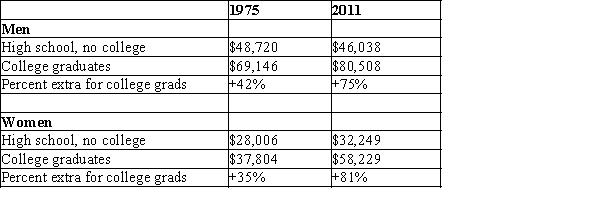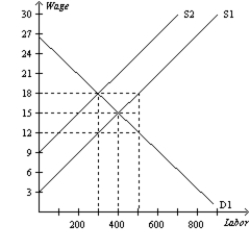A) they don't believe the wage differential really exists.
B) they can't agree on a definition of the term "discrimination."
C) they believe compensating differentials account for all wage differences.
D) different people may have different wages for reasons unrelated to discrimination.
F) C) and D)
Correct Answer

verified
Correct Answer
verified
True/False
Education and on-the-job training are sources of human capital.
B) False
Correct Answer

verified
Correct Answer
verified
Multiple Choice
Which of the following statements accurately explains the superstar phenomenon in wages?
A) Better carpenters earn more than average carpenters because people are willing to pay higher prices for higher-quality work.
B) The more productive an author is, the more books she can write each year, so the more she earns.
C) Talented movie stars earn more than equally talented mechanics because technology allows the delivery of the services provided by the movie stars to all interested customers.
D) Athletes get paid for performing services that everyday people perform as hobbies.
F) B) and D)
Correct Answer

verified
Correct Answer
verified
True/False
Discrimination is usually not a profit-maximizing strategy.
B) False
Correct Answer

verified
Correct Answer
verified
Multiple Choice
Evidence of differences in average wages of women compared to men
A) clearly illustrates differences in productivity between genders.
B) provides conclusive evidence of discrimination on the basis of gender.
C) is seldom used to provide evidence of discriminatory bias.
D) does not provide conclusive evidence of discrimination.
F) A) and C)
Correct Answer

verified
Correct Answer
verified
Multiple Choice
Scenario 19-7 Mark works full time at a large accounting firm. Mark has been at the firm for four years but has not been given a promotion, even though newer employees have already been promoted. Mark believes he is a victim of labor-market discrimination, and threatens to hire a lawyer to sue the company. -Refer to Scenario 19-7. Which of the following would strengthen Mark's case against his employer?
A) Mark is always late to important company meetings.
B) Mark has more experience than any newly-hired accountant.
C) Mark once got in a fight with another co-worker.
D) The newly-hired accountants who were promoted before Mark work 20 hours a week more than Mark does.
F) None of the above
Correct Answer

verified
Correct Answer
verified
Multiple Choice
Which of the following is not a consequence of above-equilibrium wages in a labor market?
A) a surplus of labor
B) unemployment
C) more unionized jobs
D) All of the above are consequences of above-equilibrium wages.
F) A) and B)
Correct Answer

verified
Correct Answer
verified
Multiple Choice
On average, electricians who work on dangerous high-voltage power lines earn more per hour than similarly skilled electricians who don't work on dangerous high-voltage power lines. The difference in pay is attributed to
A) the marginal product of labor.
B) the marginal product of capital.
C) diminishing marginal returns.
D) a compensating differential.
F) None of the above
Correct Answer

verified
Correct Answer
verified
Short Answer
Table 19-2  Source: US Census Bureau and Mankiw's calculations
-Refer to Table 19-2. In 2011, on average how much more income would a man with a college degree earn than a man with a high school degree?
Source: US Census Bureau and Mankiw's calculations
-Refer to Table 19-2. In 2011, on average how much more income would a man with a college degree earn than a man with a high school degree?
Correct Answer

verified
Correct Answer
verified
Multiple Choice
In the presence of discrimination by customers,
A) market forces nevertheless always work to prevent discriminatory wage differentials.
B) discriminatory wage differentials can exist, but only if firms refrain from maximizing their profits.
C) discriminatory wage differentials can exist, but only if government reinforces customers' practices by passing laws that mandate discrimination.
D) discriminatory wage differentials can exist, even in the absence of discriminatory practices by firms or by government.
F) B) and C)
Correct Answer

verified
Correct Answer
verified
Multiple Choice
If the signaling theory of education is correct,
A) workers with more years of formal schooling will earn less than workers with fewer years of formal schooling.
B) additional years of formal schooling do not increase a worker's productivity.
C) workers with more years of formal schooling are less likely to be affected by ability, effort, and chance.
D) men are more likely to earn more than women because men are more likely to have graduated from college.
F) C) and D)
Correct Answer

verified
Correct Answer
verified
Multiple Choice
Which of the following statements can be called a productivity-revealing theory?
A) human-capital theory and signaling theory
B) human-capital theory but not signaling theory
C) signaling theory but not human-capital theory
D) neither human-capital theory nor signaling theory
F) B) and C)
Correct Answer

verified
Correct Answer
verified
Multiple Choice
Which of the following is not an example of a compensating differential?
A) paying workers who do dull, boring work higher wages than workers who do fun, interesting work, all else equal
B) paying workers who work on the night shift higher wages than workers who work the day shift, all else equal
C) paying workers who do more dangerous work higher wages than workers who do less dangerous work, all else equal
D) paying workers with PhDs higher wages than workers with BAs, all else equal
F) A) and B)
Correct Answer

verified
Correct Answer
verified
Multiple Choice
Hunter is an ambitious, competitive person who has always tried to be the best at everything he does. Consider the following job options facing Hunter and choose the option that will likely afford him the highest wage.
A) elementary school teacher who works 9 months of the year
B) manager in a large firm who earns an annual salary with no potential for bonuses or commissions
C) salesperson who earns a small base salary plus a percentage of the sales he makes
D) local television news anchor who works during the day
F) A) and D)
Correct Answer

verified
Correct Answer
verified
Multiple Choice
For a "superstar" to emerge, it must be the case that
A) it is possible to supply the good or service that the superstar produces at low cost to every customer.
B) some customers are willing and able to pay large sums of money to enjoy the good or service provided by the superstar.
C) the superstar has a natural monopoly on his or her good or service.
D) the superstar can become sufficiently popular to earn income from advertisements.
F) A) and C)
Correct Answer

verified
Correct Answer
verified
Short Answer
A group of firms working together and acting as a supplier of a product is called a cartel. A group of employees working together and acting as a single supplier of labor is called a
Correct Answer

verified
Correct Answer
verified
Multiple Choice
Figure 19-4  -Refer to Figure 19-4. If a union is successful in reducing supply from S1 to S2, the wage will
-Refer to Figure 19-4. If a union is successful in reducing supply from S1 to S2, the wage will
A) rise from $15 per hour to $18 per hour and 100 fewer people will be employed.
B) rise from $15 per hour to $18 per hour and 200 more people will be employed.
C) fall from $15 per hour to $12 per hour and 100 more people will be employed.
D) fall from $18 per hour to $15 per hour and 200 fewer people will be employed.
F) A) and C)
Correct Answer

verified
Correct Answer
verified
Multiple Choice
Certain factors that are probably important in determining wages are nevertheless difficult to measure. Consequently, labor economists find those factors difficult to incorporate into their studies of labor markets and wages. Those factors include
A) effort and natural ability.
B) natural ability and years of experience.
C) years of experience and job characteristics.
D) race and job characteristics.
F) C) and D)
Correct Answer

verified
Correct Answer
verified
Multiple Choice
The ownership of human capital
A) is typically embodied in related physical capital.
B) may be subject to government restrictions on transferability.
C) is not easily transferable.
D) All of the above are correct.
F) C) and D)
Correct Answer

verified
Correct Answer
verified
True/False
Daryn and Nick work for two different companies, but each performs the same job working on a loading dock. Daryn, however, earns a higher salary than his friend Nick The difference in salary could illustrate union wages if Daryn's annual salary is covered by a collective bargaining agreement and Nick's is not.
B) False
Correct Answer

verified
Correct Answer
verified
Showing 321 - 340 of 511
Related Exams